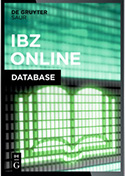telondefondo. Revista de Teoría y Crítica Teatral, ISSN N° 1669-6301, es una publicación electrónica de periodicidad semestral (julio y diciembre), de consulta libre y gratuita, en el marco del Instituto de Historia del Arte Argentino y Latinoamericano “Luis Ordaz”, de la Facultad de Filosofía y Letras de la Universidad de Buenos Aires.
La revista, dedicada a un espectro de lectores interesados, estudiosos y/o especialistas en temas teatrales, aspira a ser un espacio de diálogo e intercambio acerca de las múltiples perspectivas críticas y metacríticas de la escena actual. Presenta trabajos originales e inéditos que son sometidos al arbitraje de un Consejo Asesor integrado por reconocidos especialistas nacionales e internacionales. Los criterios evaluativos que la revista adopta son la libertad ensayística, el rigor académico y la originalidad de las ideas que los trabajos aporten a la reflexión y discusión pluralista sobre los problemas y planteamientos tematizados.
Se publicarán contribuciones del siguiente tipo: ensayos, críticas de espectáculos, entrevistas, debates, reseñas de libros, traducciones, publicaciones recibidas y notas editoriales.
Proceso de revisión por pares
Los artículos y notas serán evaluados por revisores externos seleccionados por el Comité Editor siguiendo los lineamientos del sistema de arbitraje doble ciego, que mantiene en reserva la identidad del autor y de los revisores durante el proceso de evaluación, para garantizar la calidad de los contenidos. El Comité Editor hace una primera revisión de los originales para asegurar el correcto cumplimiento de las normas de edición de la revista y la calidad del contenido. Pasada esta etapa, los artículos y notas son enviados a árbitros/as externos/as para evaluar si efectúan una contribución original a las áreas temáticas de la publicación. Su dictamen debe basarse en criterios de pertinencia y originalidad académica establecidos por la revista. Los/as revisores/as, de acuerdo a su evaluación, deberán seleccionar una decisión entre las definidas por la guía de evaluación de la revista:
- Aprobar sin modificaciones: El envío reúne los requisitos y responde a las exigencias de la revista (originalidad, actualidad, estar correctamente escrito, ser resultado de una investigación, contener un desarrollo metodológico claro y un análisis consistente de los datos, discusión con bibliografía actualizada). De haber coincidencia entre los dictámenes, la Asistente de Redacción informará la decisión a través de un correo electrónico y enviará los dictámenes. El artículo pasa, entonces, a la etapa de corrección de estilo y edición.
- Aprobar con modificaciones: El artículo se encuentra dentro de los parámetros establecidos por la revista pero los/as evaluadores/as requieren que se realicen o bien modificaciones menores de estilo y correcciones ortotipográficas, o bien modificaciones mayores de contenido, estructura, redacción e incorporación de bibliografía. La Asistente de Redacción enviará los dictámenes con las sugerencias de los/as revisores/as y el autor tendrá un lapso de 30 (treinta) días para realizar las modificaciones sugeridas. Una vez que el artículo modificado sea subido nuevamente al sistema, el Comité Editor lo revisará y decidirá publicar o rechazar del artículo.
- Rechazar: El/la evaluador/a considera que el artículo tiene falencias importantes y no reúne los requisitos mínimos para ser publicado en la revista de acuerdo a las normas de la misma. Si la evaluación de los revisores coincidiera en no aceptar la publicación del artículo, la Asistente de Redacción informará la decisión a través de un correo electrónico y enviará los dictámenes.
Políticas de acceso y reuso
telondefondo publica todo su contenido en acceso abierto y sin período de embargo.
El contenido de esta revista está bajo una Licencia Creative Commons Atribución-CompartirIgual 4.0 Internacional que autoriza la copia, el uso, la difusión y la transformación del contenido publicado a condición de que 1) se cite la autoría y la fuente original de su publicación (revista, editorial y URL de la obra) y 2) se distribuya su contribución bajo la misma licencia del original.
Política de autoarchivo
Esta revista permite el depósito en repositorios, páginas institucionales u otros, de todas las versiones del artículo.
Código de ética
telondefondo sigue principios éticos que rigen en el ámbito internacional en todo su proceso editorial. Adhiere en este sentido a los principios previstos por el Committee on Publication Ethics (COPE). Ver más en: https://publicationethics.org/guidance/Guidelines
Política antiplagio
telondefondo busca garantizar que todos los trabajos científicos publicados sean originales e inéditos y no hayan sido publicados previamente en otro formato, sea total o parcialmente. El control del plagio se llevará a cabo por el comité editorial antes de que inicie la revisión por pares, a través de diversos programas de detección de plagio (PlagScan y Plagiarism Checker by Grammarly, entre otros).










